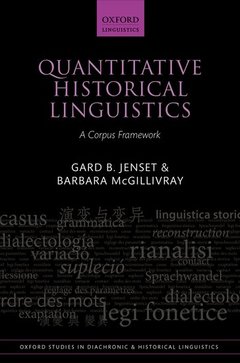Description
Quantitative Historical Linguistics
A Corpus Framework
Oxford Studies in Diachronic and Historical Linguistics Series, Vol. 26
Authors: Jenset Gard B., McGillivray Barbara
Language: English
Subject for Quantitative Historical Linguistics:
Approximative price 125.23 €
In Print (Delivery period: 21 days).
Add to cart
Publication date: 10-2017
248 p. · 17.3x24.2 cm · Hardback
248 p. · 17.3x24.2 cm · Hardback
Description
/li>Biography
/li>
This book is an innovative guide to quantitative, corpus-based research in historical and diachronic linguistics. Gard B. Jenset and Barbara McGillivray argue that, although historical linguistics has been successful in using the comparative method, the field lags behind other branches of linguistics with respect to adopting quantitative methods. Here they provide a theoretically agnostic description of a new framework for quantitatively assessing models and hypotheses in historical linguistics, based on corpus data and using case studies to illustrate how this framework can answer research questions in historical linguistics. The authors offer an in-depth explanation and discussion of the benefits of working with quantitative methods, corpus data, and corpus annotation, and the advantages of open and reproducible research. The book will be a valuable resource for graduate students and researchers in historical linguistics, as well as for all those working with linguistic corpora.
Gard B. Jenset studied English, history, and computer science before earning his PhD in English linguistics, specializing in historical corpus linguistics, from the University of Bergen (2010). After working as an associate professor of English Linguistics at Bergen University College, he took up work on artificial intelligence, natural language processing, and computational linguistics in industry. He has published research in historical linguistics, corpus linguistics, and applied linguistics. Barbara McGillivray holds a degree in Mathematics and one in Classics from the University of Florence (Italy), and a Ph.D. in Computational Linguistics from the University of Pisa (2010). She has worked as a language technologist in the Dictionary division of Oxford University Press and as a data scientist in the Open Research Group of Springer Nature. She is currently a Research Fellow at the Alan Turing Institute/University of Cambridge. She has published in the fields of mathematics, corpus linguistics, computational linguistics, historical linguistics, and lexicography. Her monograph Methods in Latin Computational Linguistics was published by Brill in 2013.
© 2024 LAVOISIER S.A.S.




